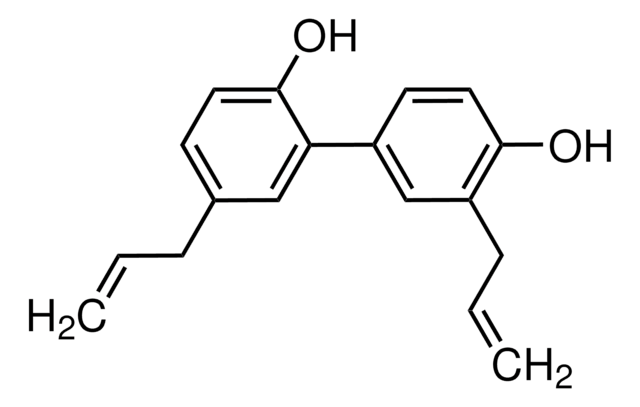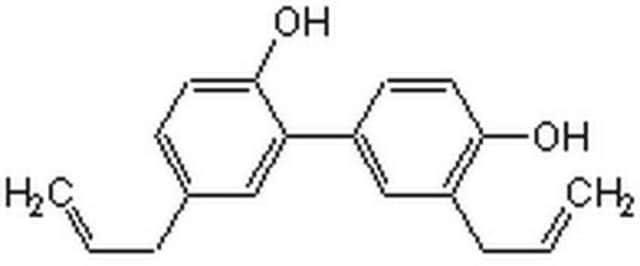M3445
Magnolol
≥90% (HPLC), from plant
Synonyme(s) :
2,2′-Bichavicol, 5,5′-Diallyl-2,2′-biphenyldiol
About This Item
Produits recommandés
Source biologique
plant
Niveau de qualité
Pureté
≥90% (HPLC)
Solubilité
ethanol: soluble 1 mg/mL
methanol: soluble 1.5 mg/mL
Spectre d'activité de l'antibiotique
Gram-negative bacteria
Gram-positive bacteria
fungi
Application(s)
metabolomics
vitamins, nutraceuticals, and natural products
Mode d’action
cell membrane | interferes
Température de stockage
2-8°C
Chaîne SMILES
Oc1ccc(CC=C)cc1-c2cc(CC=C)ccc2O
InChI
1S/C18H18O2/c1-3-5-13-7-9-17(19)15(11-13)16-12-14(6-4-2)8-10-18(16)20/h3-4,7-12,19-20H,1-2,5-6H2
Clé InChI
VVOAZFWZEDHOOU-UHFFFAOYSA-N
Vous recherchez des produits similaires ? Visite Guide de comparaison des produits
Description générale
Application
- to test its effect on muscle atrophy and macrophage subtypes in sarcopenia mouse model
- to test its inhibitory effect on human umbilical vein endothelial cells (HUVECs) in angiogenesis assay
- to test its anti-fungal effects on growth, ultrastructure, and biofilm formation of Candida spp. strains
- in the preparation of immobilized amino-functionalized mesoporous silica particles for prolonged-release studies
Actions biochimiques/physiologiques
Mention d'avertissement
Danger
Mentions de danger
Conseils de prudence
Classification des risques
Aquatic Chronic 2 - Eye Dam. 1 - Skin Irrit. 2 - STOT SE 3
Organes cibles
Respiratory system
Code de la classe de stockage
11 - Combustible Solids
Classe de danger pour l'eau (WGK)
WGK 3
Équipement de protection individuelle
dust mask type N95 (US), Eyeshields, Gloves
Certificats d'analyse (COA)
Recherchez un Certificats d'analyse (COA) en saisissant le numéro de lot du produit. Les numéros de lot figurent sur l'étiquette du produit après les mots "Lot" ou "Batch".
Déjà en possession de ce produit ?
Retrouvez la documentation relative aux produits que vous avez récemment achetés dans la Bibliothèque de documents.
Les clients ont également consulté
Articles
Chronic inflammation is an underlying factor in the development and progression of many of the chronic diseases of aging, such as arthritis, atherosclerosis, diabetes, and cancer.
Antioxidants protect biological systems from oxidative damage produced by oxygen-containing free radicals and from redoxactive transition metal ions such as iron, copper, and cadmium.
Notre équipe de scientifiques dispose d'une expérience dans tous les secteurs de la recherche, notamment en sciences de la vie, science des matériaux, synthèse chimique, chromatographie, analyse et dans de nombreux autres domaines..
Contacter notre Service technique













